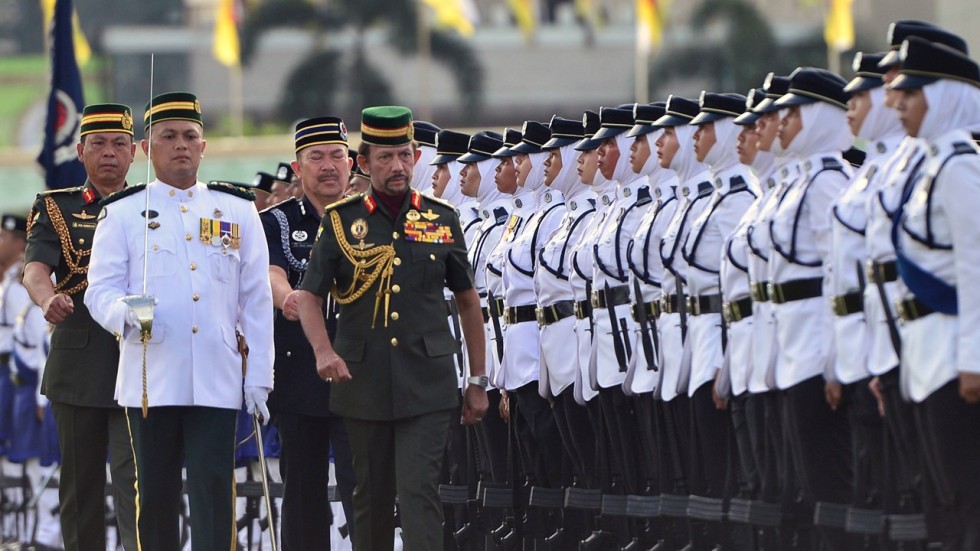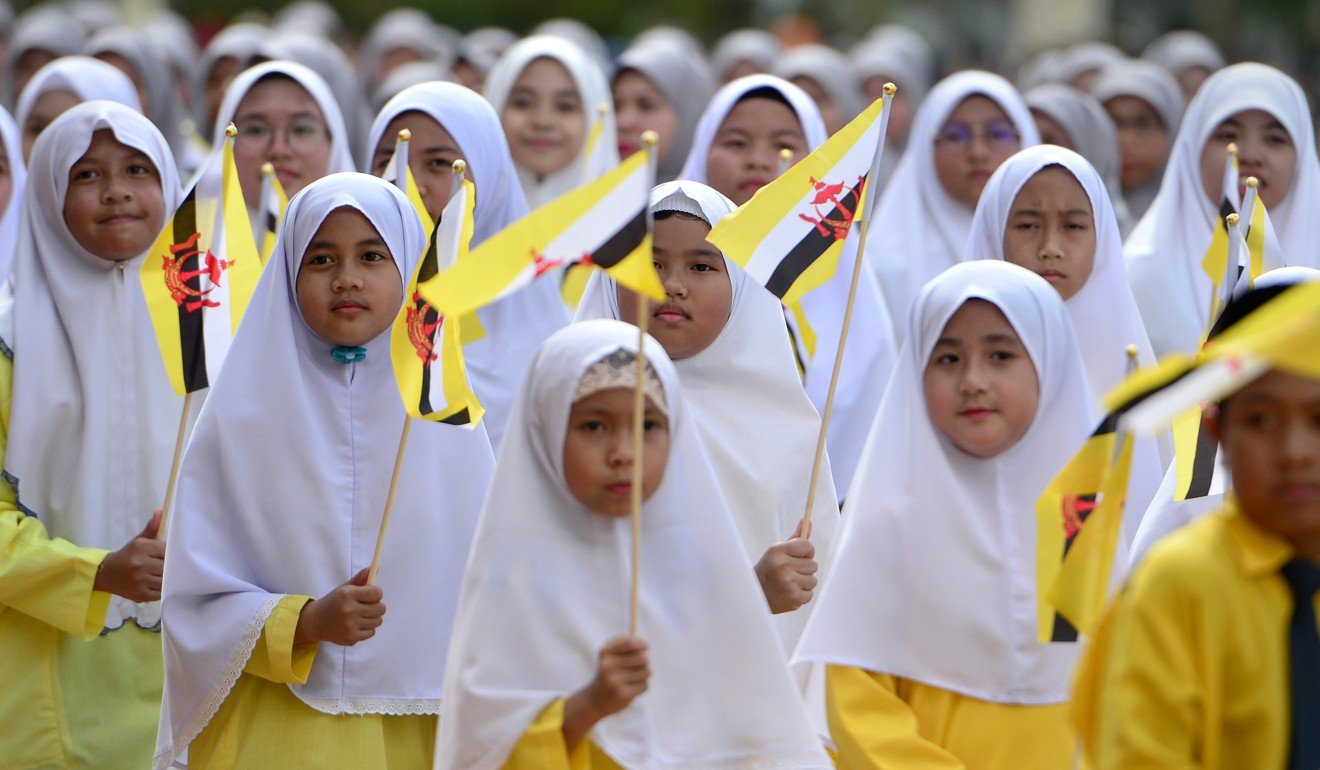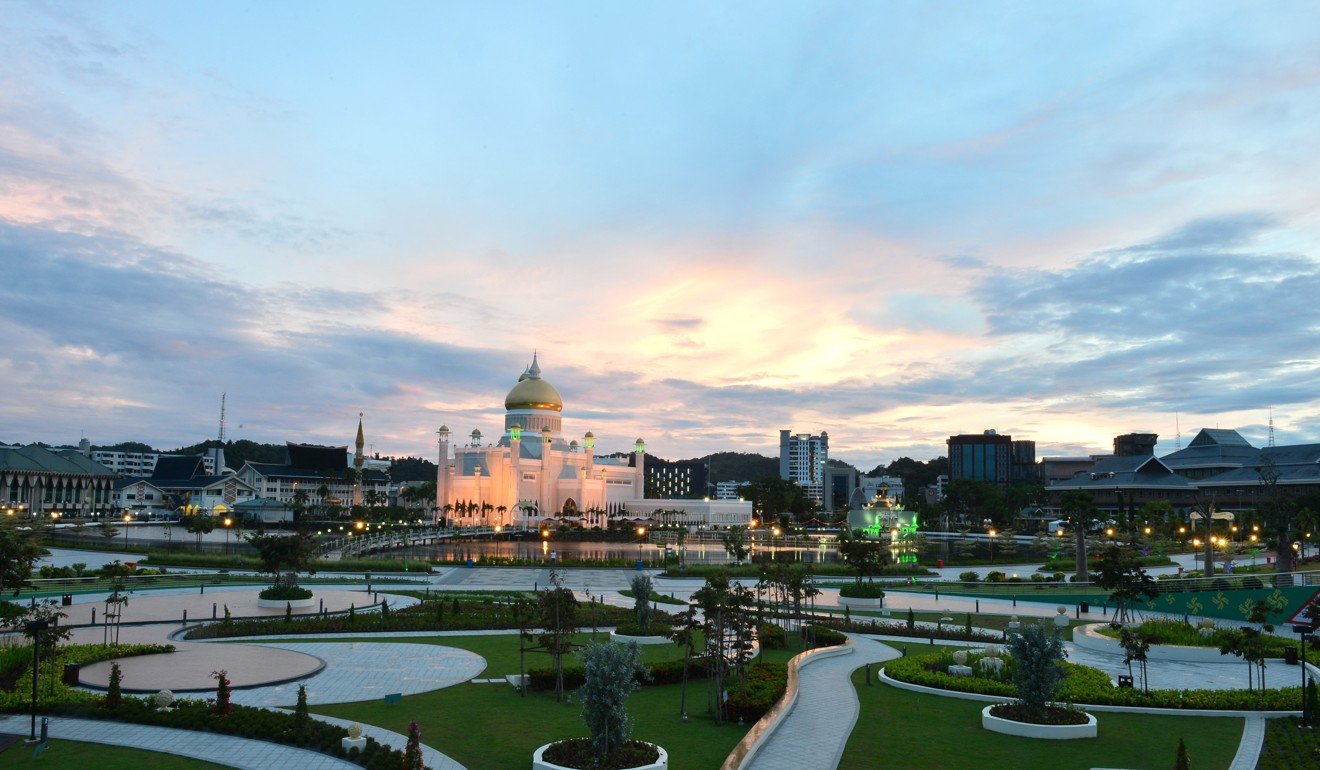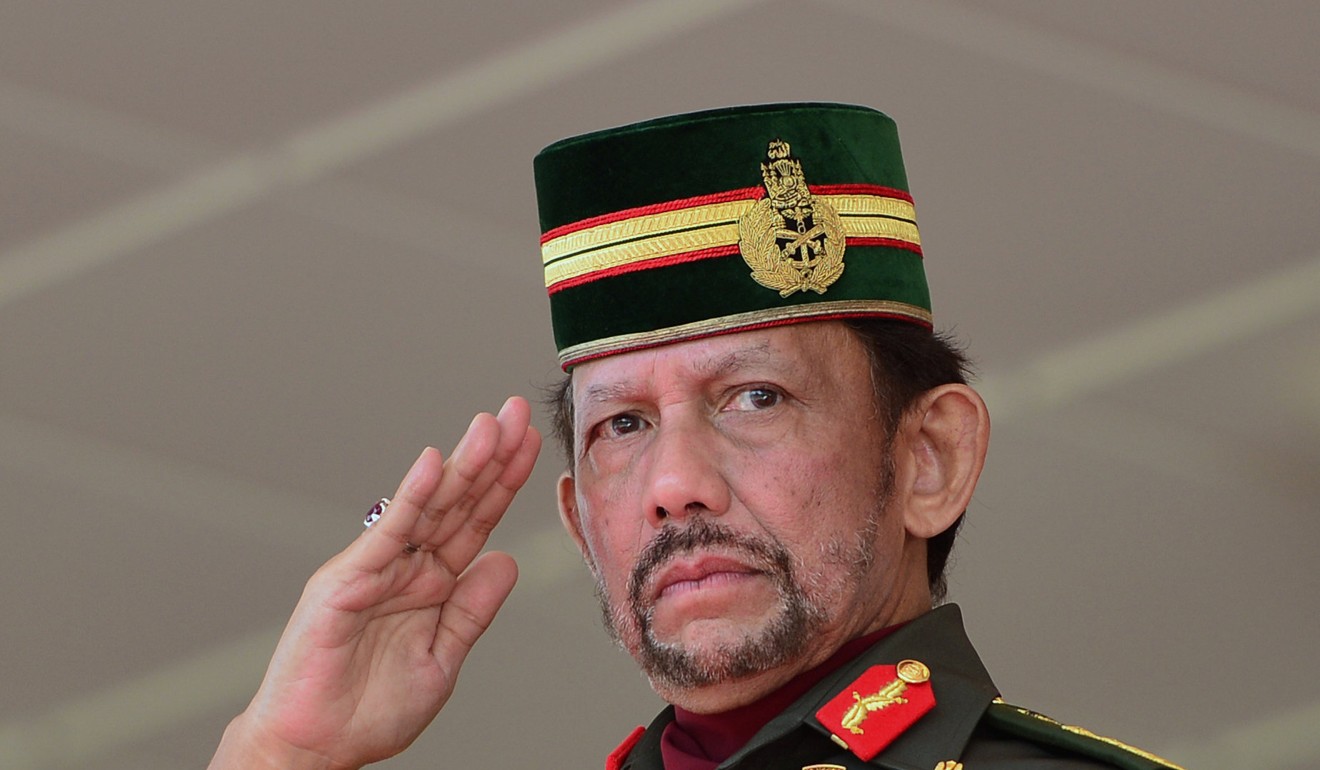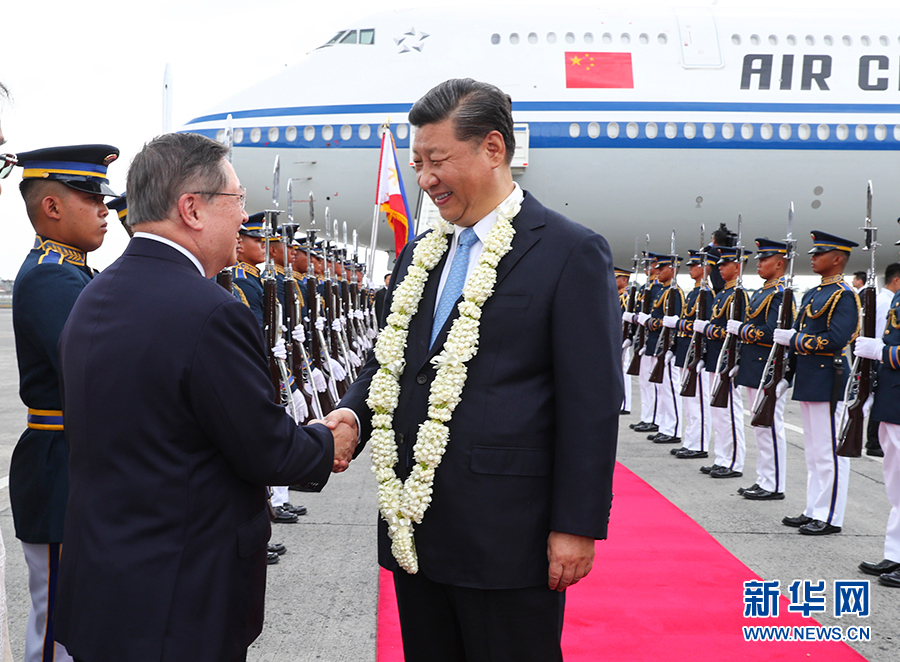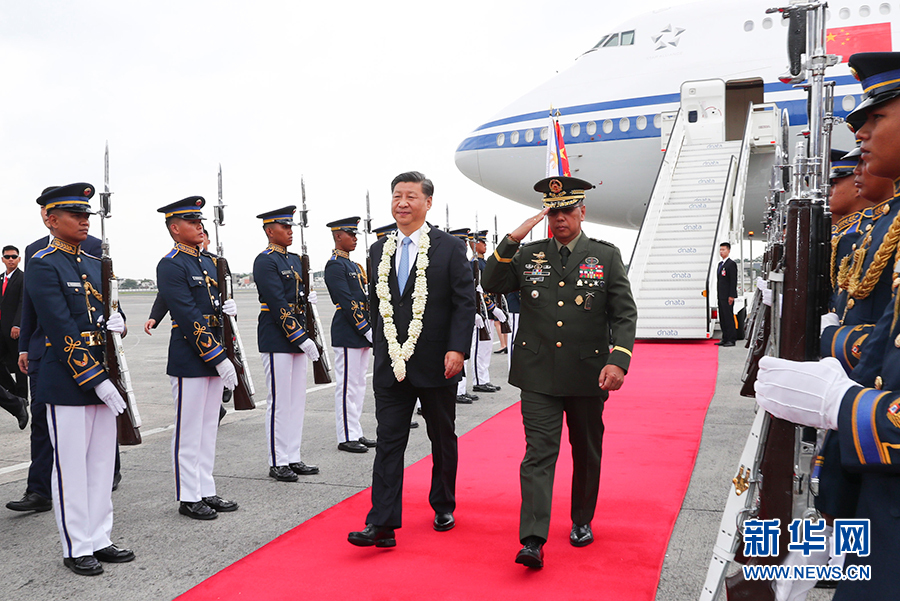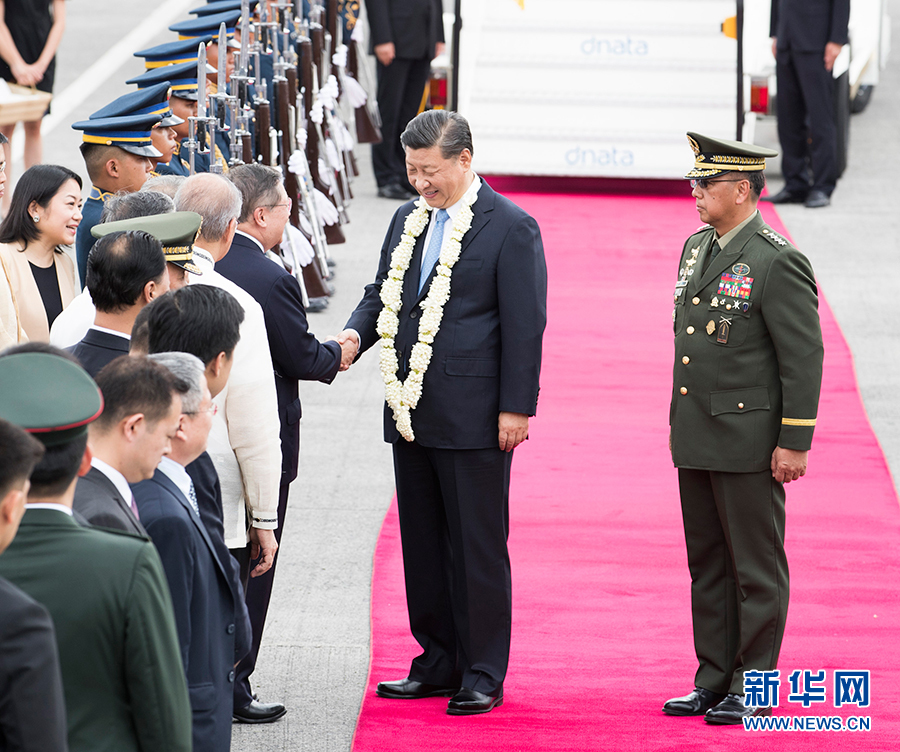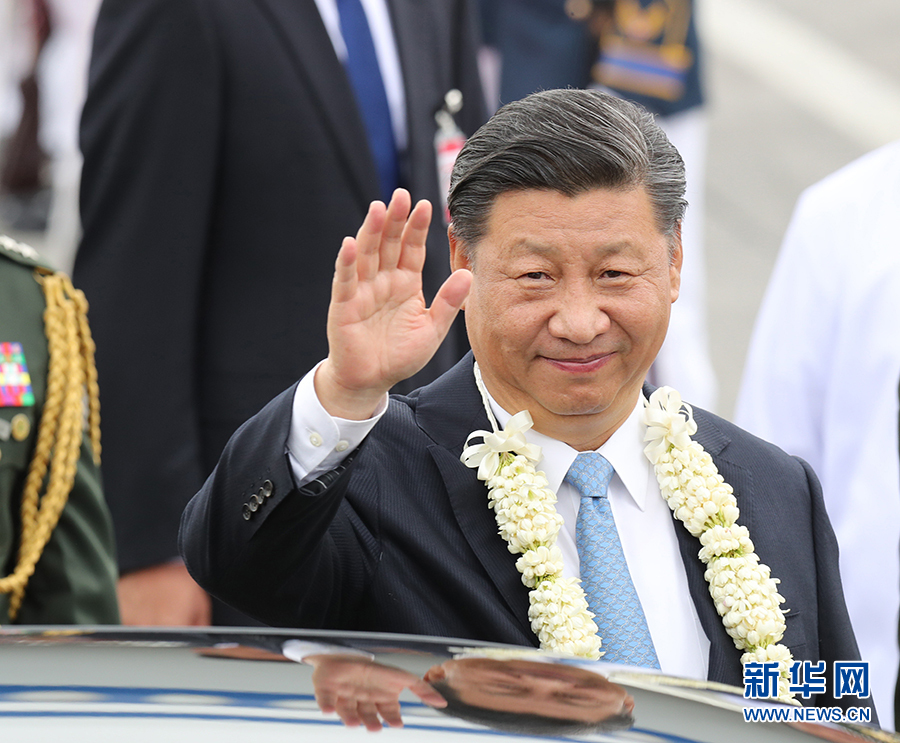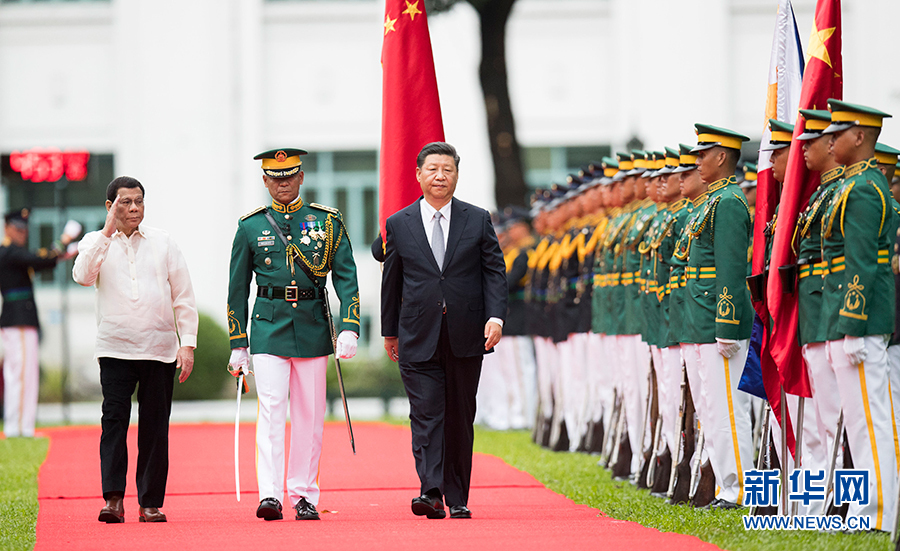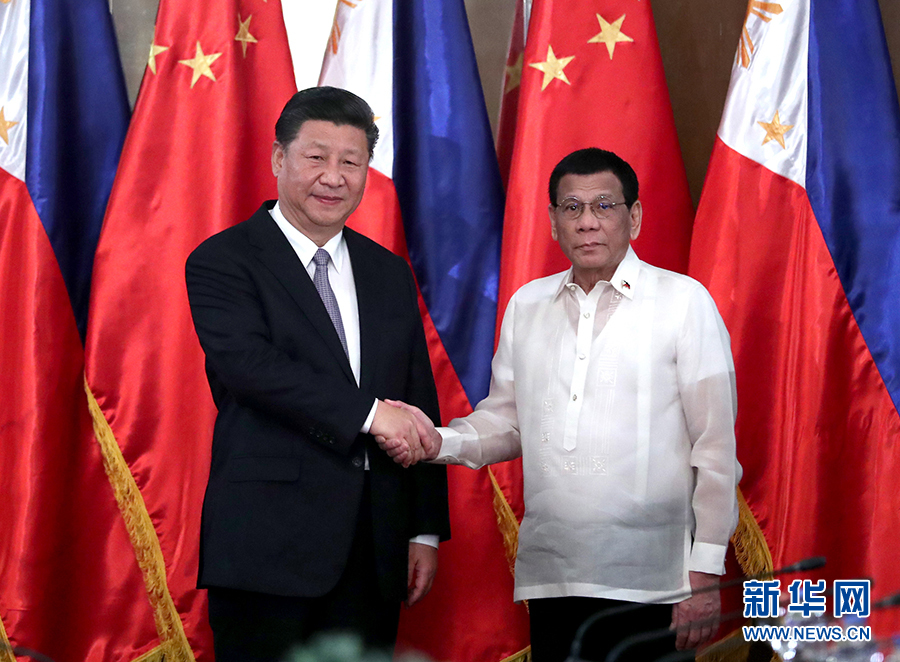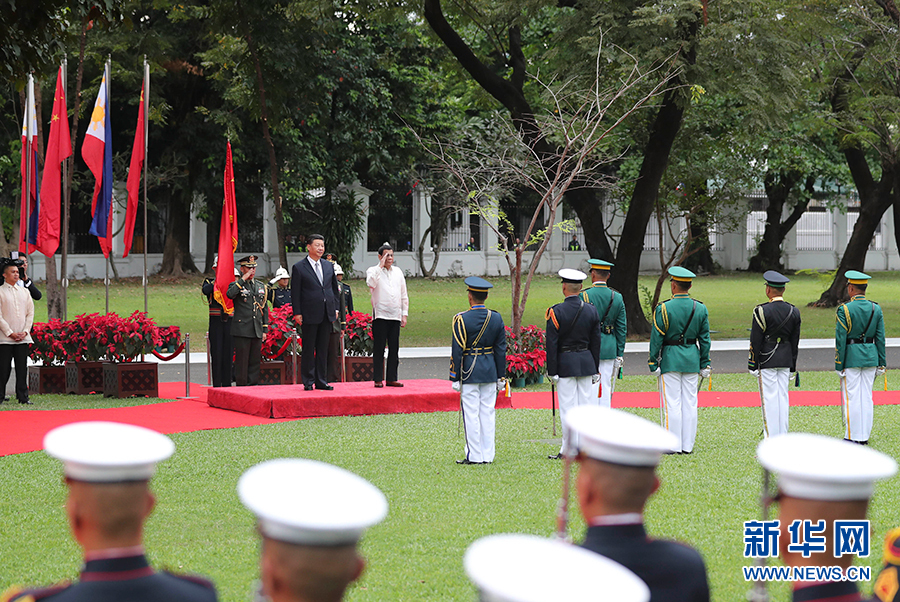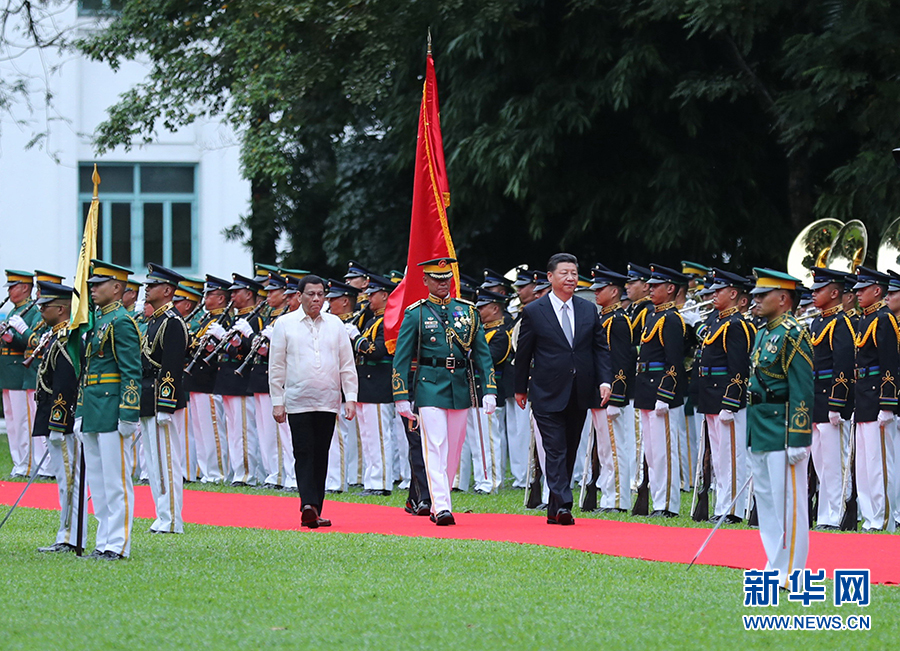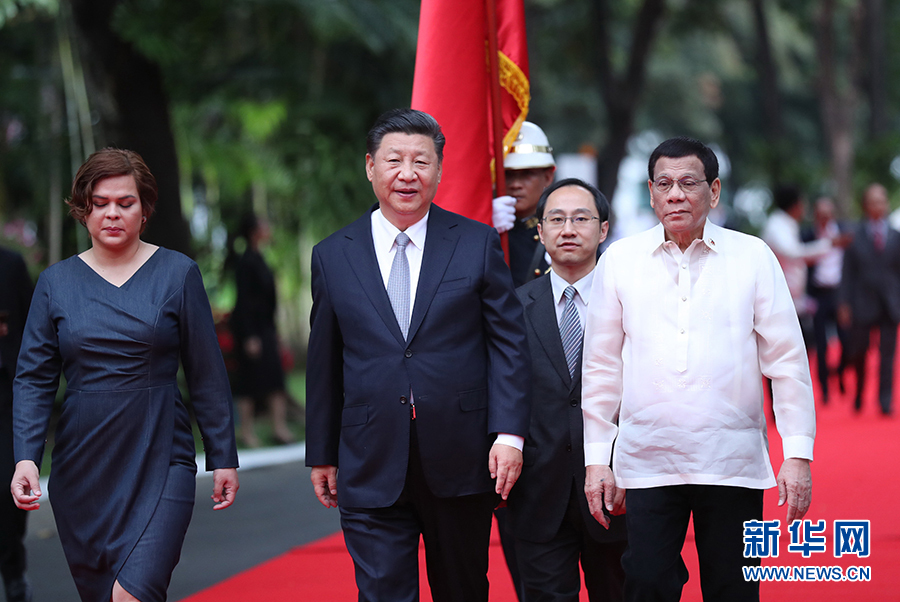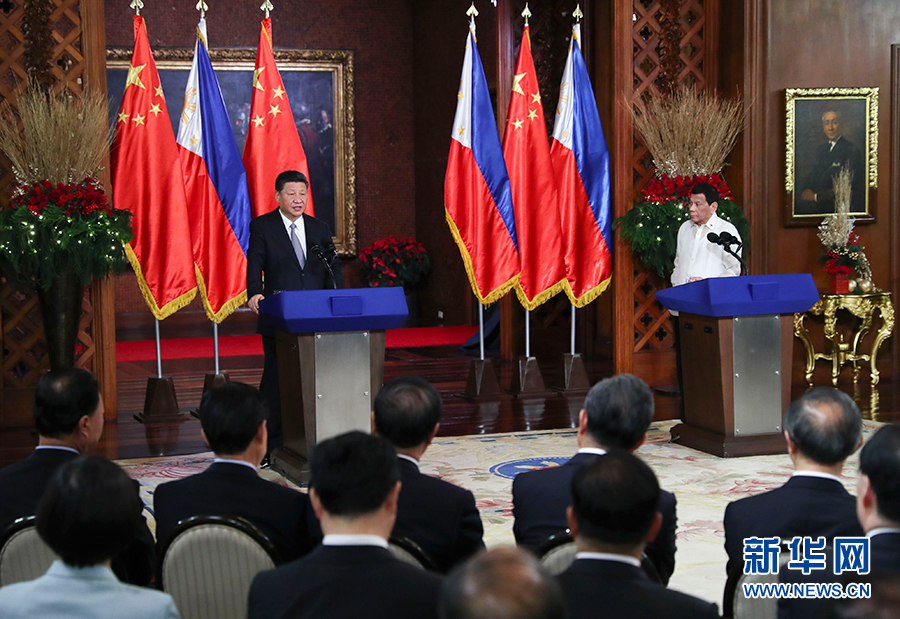http://www.xinhuanet.com/politics/leaders/2018-11/19/c_129997579.htm
习主席19日出访活动精彩图集
2018-11-19 23:53:19 来源: 新华国际客户端
关注新华网
微信
微博
Qzone
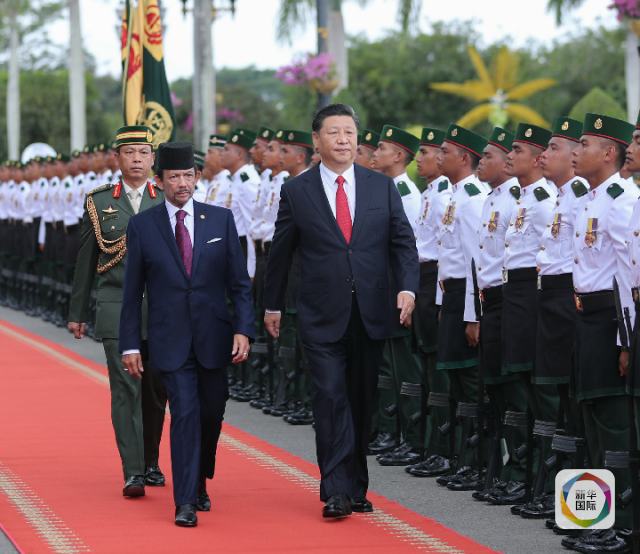 11月19日,国家主席习近平在斯里巴加湾同文莱苏丹哈桑纳尔举行会谈。会谈开始前,习近平出席哈桑纳尔在王宫前广场举行的盛大欢迎仪式。这是在哈桑纳尔陪同下,习近平检阅仪仗队。新华社记者 鞠鹏 摄
11月19日,国家主席习近平在斯里巴加湾同文莱苏丹哈桑纳尔举行会谈。会谈开始前,习近平出席哈桑纳尔在王宫前广场举行的盛大欢迎仪式。这是在哈桑纳尔陪同下,习近平检阅仪仗队。新华社记者 鞠鹏 摄
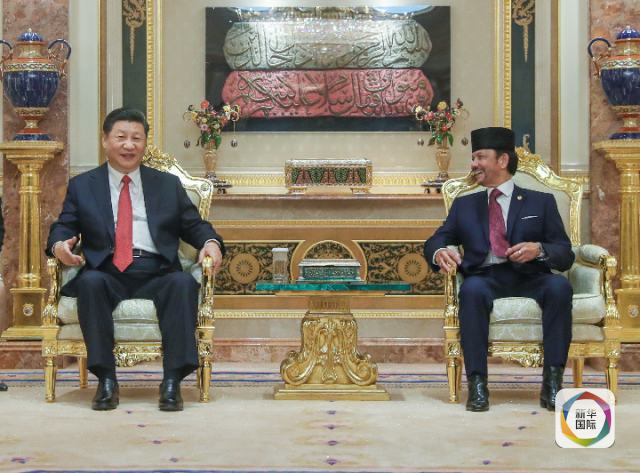 11月19日,国家主席习近平在斯里巴加湾同文莱苏丹哈桑纳尔举行会谈。新华社记者 鞠鹏 摄
11月19日,国家主席习近平在斯里巴加湾同文莱苏丹哈桑纳尔举行会谈。新华社记者 鞠鹏 摄
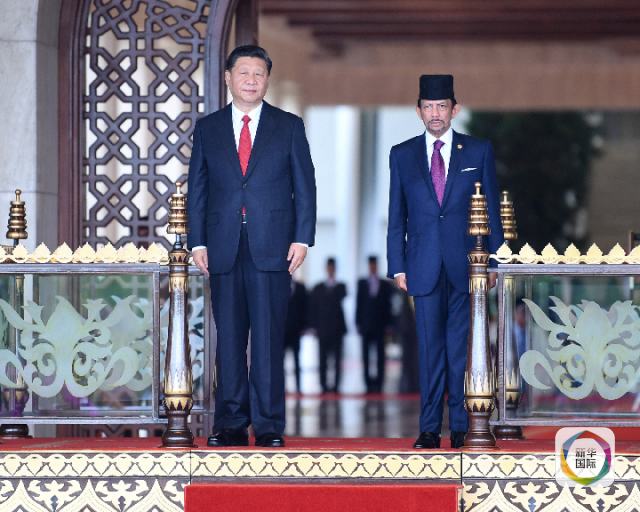 11月19日,国家主席习近平在斯里巴加湾同文莱苏丹哈桑纳尔举行会谈。这是会谈开始前,习近平出席哈桑纳尔在王宫前广场举行的盛大欢迎仪式。 新华社记者 燕雁 摄
11月19日,国家主席习近平在斯里巴加湾同文莱苏丹哈桑纳尔举行会谈。这是会谈开始前,习近平出席哈桑纳尔在王宫前广场举行的盛大欢迎仪式。 新华社记者 燕雁 摄
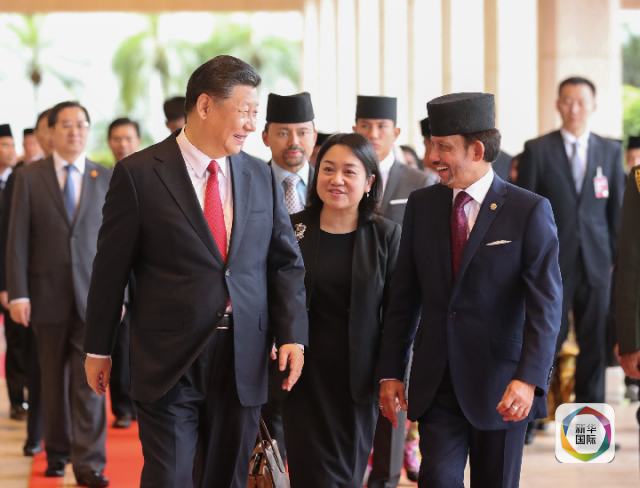 11月19日,国家主席习近平在斯里巴加湾同文莱苏丹哈桑纳尔举行会谈。这是会谈前,习近平同哈桑纳尔步入会场。新华社记者 鞠鹏 摄
11月19日,国家主席习近平在斯里巴加湾同文莱苏丹哈桑纳尔举行会谈。这是会谈前,习近平同哈桑纳尔步入会场。新华社记者 鞠鹏 摄
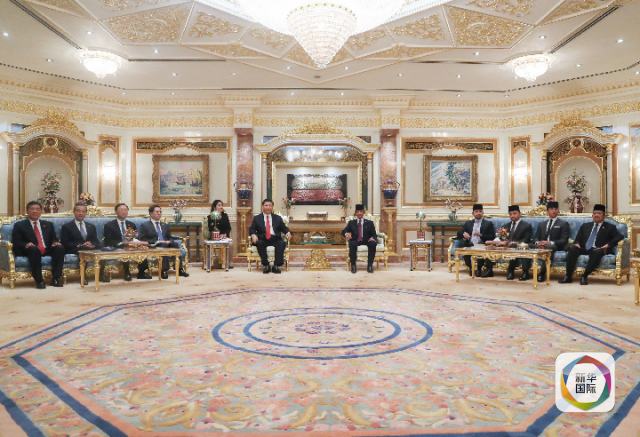 11月19日,国家主席习近平在斯里巴加湾同文莱苏丹哈桑纳尔举行会谈。新华社记者 鞠鹏 摄
11月19日,国家主席习近平在斯里巴加湾同文莱苏丹哈桑纳尔举行会谈。新华社记者 鞠鹏 摄
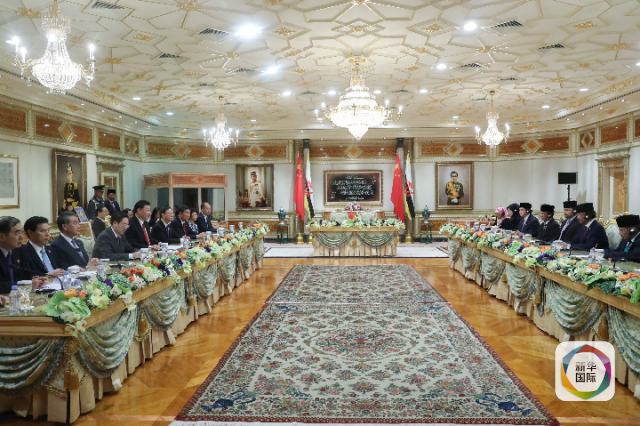 11月19日,国家主席习近平在斯里巴加湾同文莱苏丹哈桑纳尔举行会谈。新华社记者 鞠鹏 摄
11月19日,国家主席习近平在斯里巴加湾同文莱苏丹哈桑纳尔举行会谈。新华社记者 鞠鹏 摄
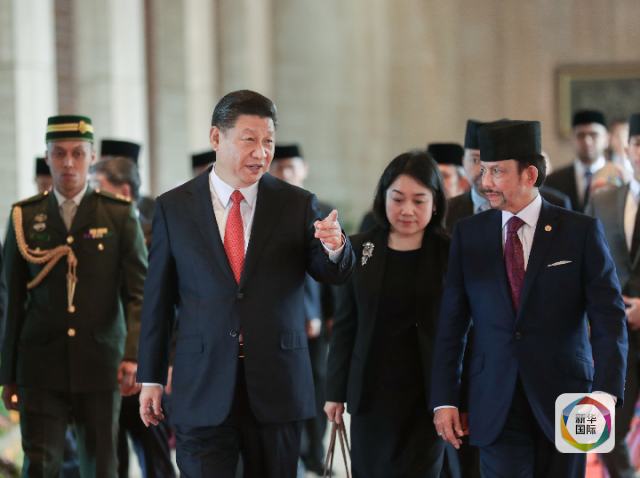 11月19日,国家主席习近平在斯里巴加湾同文莱苏丹哈桑纳尔举行会谈。这是习近平同哈桑纳尔亲切交谈。新华社记者 鞠鹏 摄
11月19日,国家主席习近平在斯里巴加湾同文莱苏丹哈桑纳尔举行会谈。这是习近平同哈桑纳尔亲切交谈。新华社记者 鞠鹏 摄
GVGT click here:
http://www.xinhuanet.com/politics/leaders/2018-11/19/c_1123735386.htm
习近平同文莱苏丹哈桑纳尔举行会谈
2018-11-19 15:01:59 来源: 新华网
关注学习进行时
微信
微博
Qzone
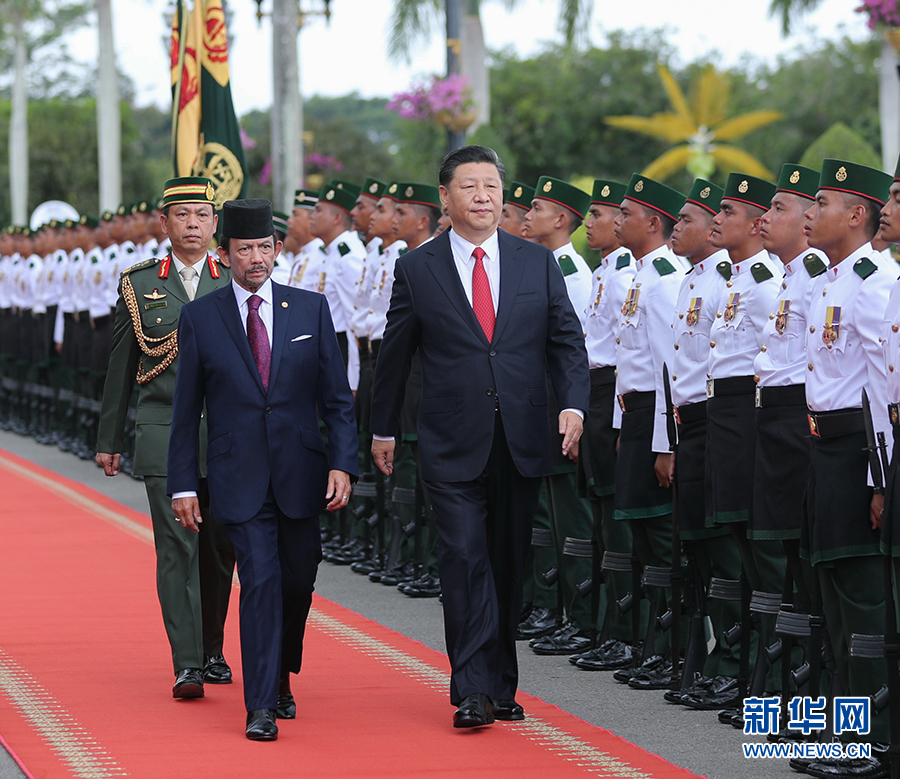 11月19日,国家主席习近平在斯里巴加湾同文莱苏丹哈桑纳尔举行会谈。会谈开始前,习近平出席哈桑纳尔在王宫前广场举行的盛大欢迎仪式。这是在哈桑纳尔陪同下,习近平检阅仪仗队。 新华社记者 鞠鹏 摄
11月19日,国家主席习近平在斯里巴加湾同文莱苏丹哈桑纳尔举行会谈。会谈开始前,习近平出席哈桑纳尔在王宫前广场举行的盛大欢迎仪式。这是在哈桑纳尔陪同下,习近平检阅仪仗队。 新华社记者 鞠鹏 摄
新华社斯里巴加湾市11月19日电(记者霍小光 李建敏 魏建华)国家主席习近平19日在斯里巴加湾同文莱苏丹哈桑纳尔举行会谈。两国元首高度评价中文关系积极发展势头,一致决定建立中文战略合作伙伴关系,做政治互信、经济互利、人文互通、多边互助的好伙伴。
习近平高度赞赏哈桑纳尔长期关心和重视中文关系。习近平指出,这是我第一次到访文莱,文莱人民的热情友好、特别是沿途欢迎的青少年脸上洋溢的真挚友好笑容,令人感动。这是中文两国人民深厚友谊的真实写照。文莱政通人和,人民安居乐业,不愧“和平之邦”的美誉。中国和文莱历史文化联系悠久深厚。两国是隔海相望的近邻,也是相互信赖的朋友和伙伴。双方决定建立战略合作伙伴关系,就是要做政治互信、经济互利、人文互通、多边互助的好伙伴,让合作成果更好惠及两国人民。
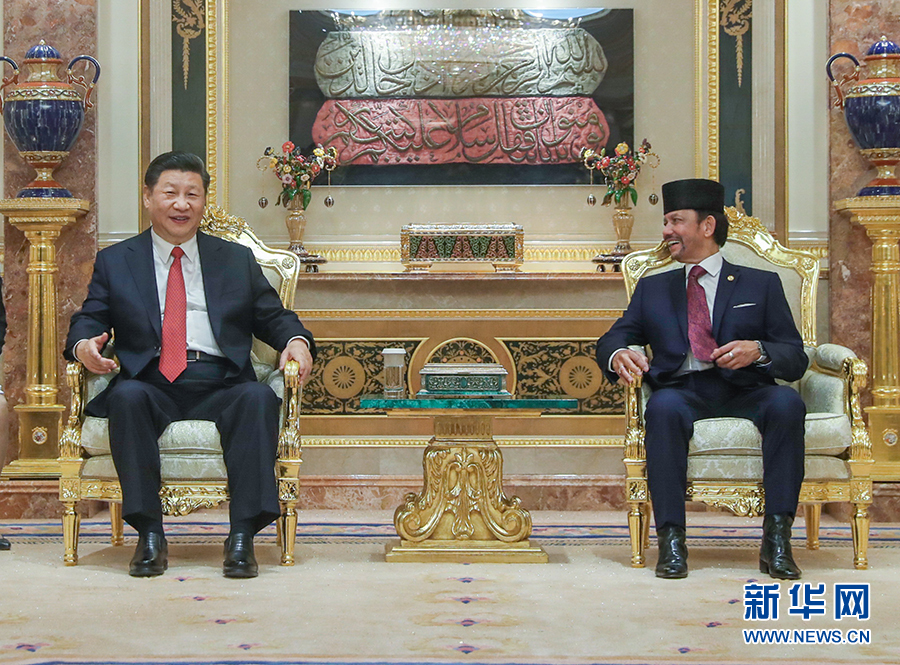 11月19日,国家主席习近平在斯里巴加湾同文莱苏丹哈桑纳尔举行会谈。 新华社记者 鞠鹏 摄
11月19日,国家主席习近平在斯里巴加湾同文莱苏丹哈桑纳尔举行会谈。 新华社记者 鞠鹏 摄
习近平强调,双方要密切高层交往,为两国关系发展掌好舵。中方赞赏文方坚定奉行一个中国政策,将继续支持文莱走符合自身国情的发展道路。中方视文莱为建设21世纪海上丝绸之路重要合作伙伴,愿将“一带一路”倡议同文莱经济多元化战略“2035宏愿”相对接,做好两国互利合作大文章。中方欢迎文莱企业扩大对华出口,愿同文方加强基础设施建设、农业、渔业、能源等领域合作,分享数字经济、电子商务等新兴领域发展经验。双方要加强教育、文化、体育、卫生、旅游等领域合作,增进两国青年一代了解和友谊,扩大地方交流,加强司法、反恐、打击跨国犯罪等领域合作。要深化在联合国、亚太经合组织框架内的沟通协调和相互配合,携手推动中国-东盟关系和东亚合作实现更大发展。中国支持东盟东部增长区合作,支持东盟实现全面平衡发展。
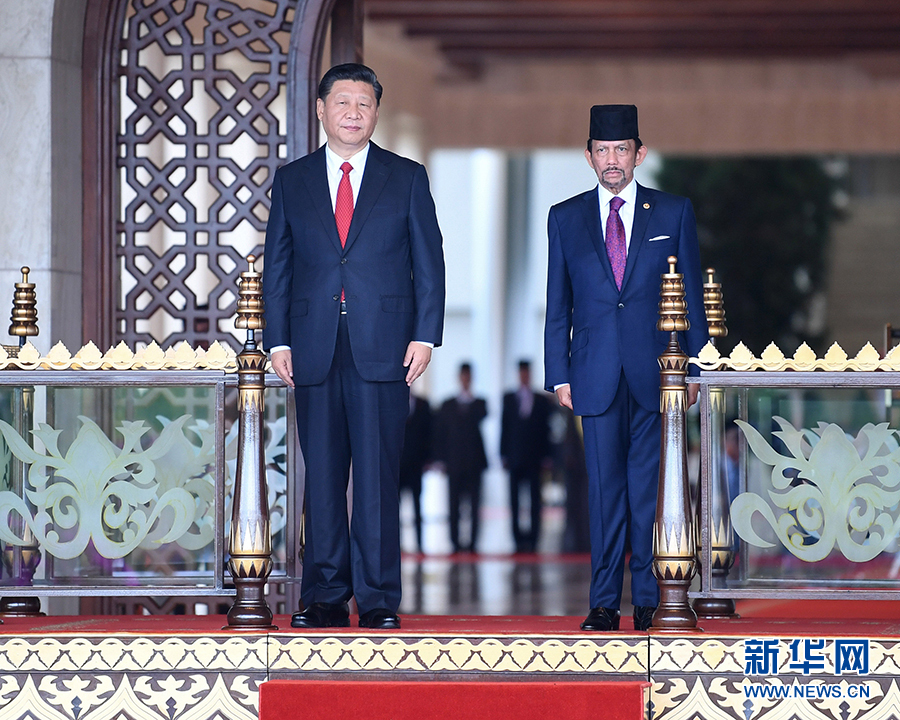 11月19日,国家主席习近平在斯里巴加湾同文莱苏丹哈桑纳尔举行会谈。这是会谈开始前,习近平出席哈桑纳尔在王宫前广场举行的盛大欢迎仪式。 新华社记者 燕雁 摄
11月19日,国家主席习近平在斯里巴加湾同文莱苏丹哈桑纳尔举行会谈。这是会谈开始前,习近平出席哈桑纳尔在王宫前广场举行的盛大欢迎仪式。 新华社记者 燕雁 摄
习近平指出,维护南海和平稳定事关中国和文莱切身利益,也是两国人民共同愿望。中方赞赏文方提出的双轨思路,即当事国通过友好协商处理争议,地区国家共同维护南海稳定。我们要持续推进海上合作和“南海行为准则”磋商,将南海建设成和平之海、友谊之海、合作之海。
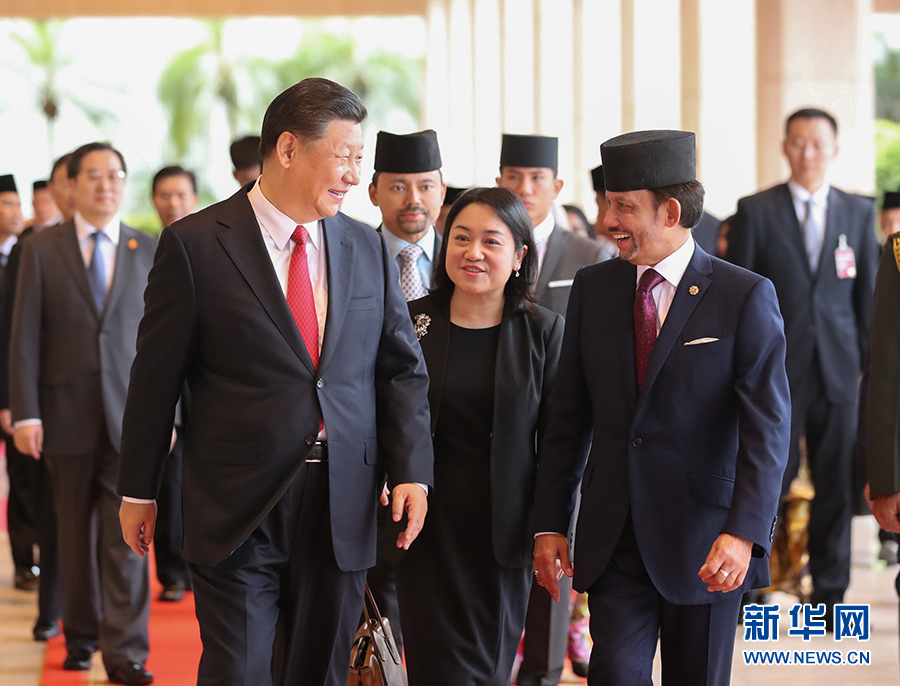 11月19日,国家主席习近平在斯里巴加湾同文莱苏丹哈桑纳尔举行会谈。这是会谈前,习近平同哈桑纳尔步入会场。 新华社记者 鞠鹏 摄
11月19日,国家主席习近平在斯里巴加湾同文莱苏丹哈桑纳尔举行会谈。这是会谈前,习近平同哈桑纳尔步入会场。 新华社记者 鞠鹏 摄
哈桑纳尔表示,热烈欢迎习近平主席首次访问文莱,此访必将深化两国传统友好关系、加强两国各领域互利合作。文中友谊历史悠久,两国关系在相互尊重、互利共赢的基础上不断加强。很高兴习主席此访期间,两国关系提升到战略合作伙伴关系。文方坚定奉行一个中国政策,愿以习主席此访为契机,加强双方在贸易、投资、农业、旅游、教育、人文、司法协助等领域交流合作,促进两国人民福祉。文方钦佩中国在减贫、可持续发展等领域取得的巨大成就,愿加强“2035宏愿”战略同“一带一路”倡议对接合作。文莱高度评价中国在促进全球稳定繁荣、应对气候变化、维护多边贸易体制、推动区域经济一体化方面的重要作用,感谢中国支持东盟东部增长区合作,愿加强文中在国际和地区事务中的沟通和协调,推动东盟同中国合作不断深化。文莱对本地区国家通过对话协商共同维护南海地区和平稳定、推进海上合作感到高兴。
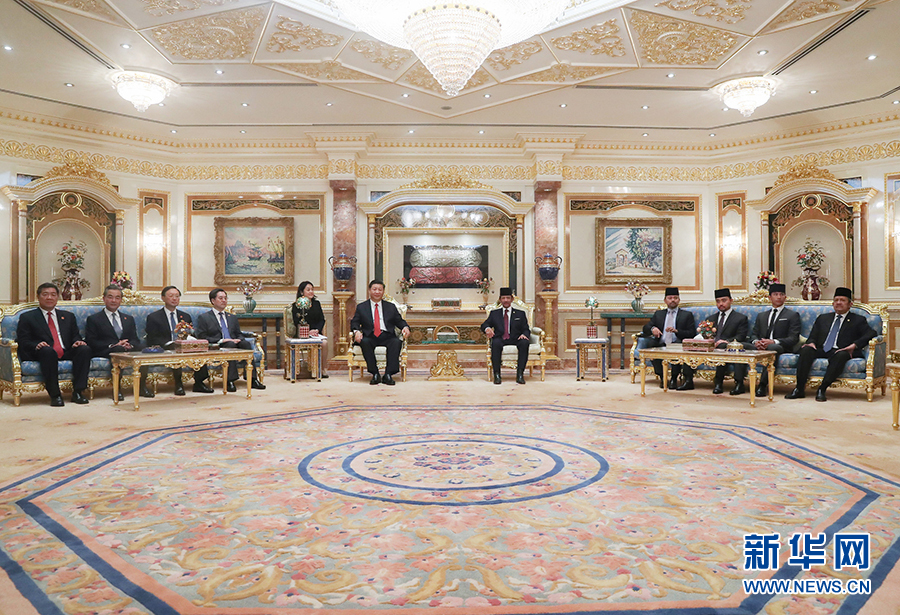 11月19日,国家主席习近平在斯里巴加湾同文莱苏丹哈桑纳尔举行会谈。 新华社记者 鞠鹏 摄
11月19日,国家主席习近平在斯里巴加湾同文莱苏丹哈桑纳尔举行会谈。 新华社记者 鞠鹏 摄
会谈后,两国元首见证了共建“一带一路”合作规划等双边合作文件的签署。
双方发表了《中华人民共和国和文莱达鲁萨兰国联合声明》。
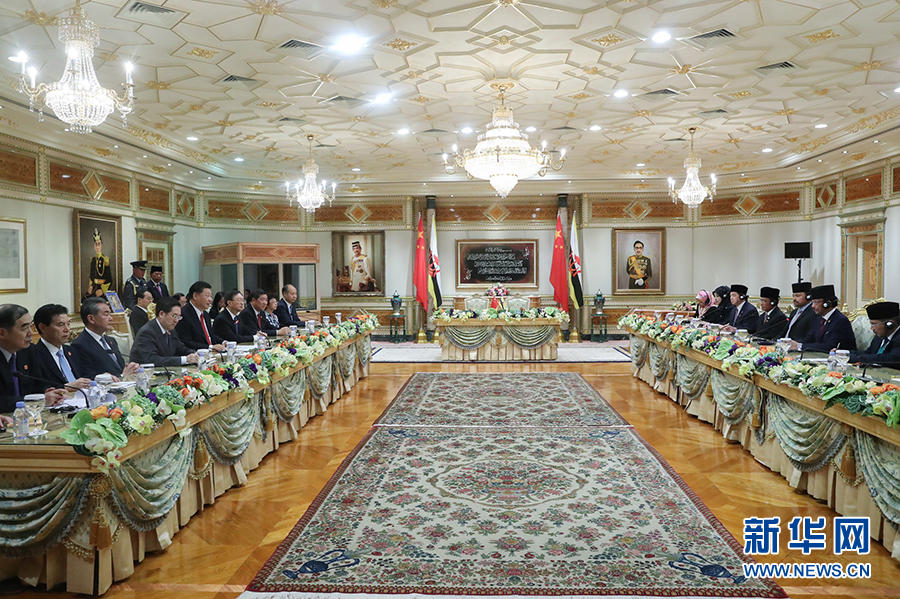 11月19日,国家主席习近平在斯里巴加湾同文莱苏丹哈桑纳尔举行会谈。 新华社记者 鞠鹏 摄
11月19日,国家主席习近平在斯里巴加湾同文莱苏丹哈桑纳尔举行会谈。 新华社记者 鞠鹏 摄
会谈开始前,习近平出席哈桑纳尔在王宫前广场举行的盛大欢迎仪式。
11月的斯里巴加湾,碧海蓝天,风景如画。当天上午,文莱王储比拉来到中国代表团下榻处,迎请习近平。
王宫附近道路旁边,4000多名朝气蓬勃的当地中小学生挥舞中文两国国旗,热烈欢迎中国贵宾。
习近平抵达王宫时,哈桑纳尔在停车处热情迎接。两国元首登上检阅台。仪仗队行礼,军乐队奏中文两国国歌。现场鸣放21响礼炮。在哈桑纳尔陪同下,习近平检阅仪仗队。检阅毕,两国元首前往王宫内廷。习近平同文莱王室成员、主要官员及各国驻文莱使节握手。哈桑纳尔同中方陪同人员握手。
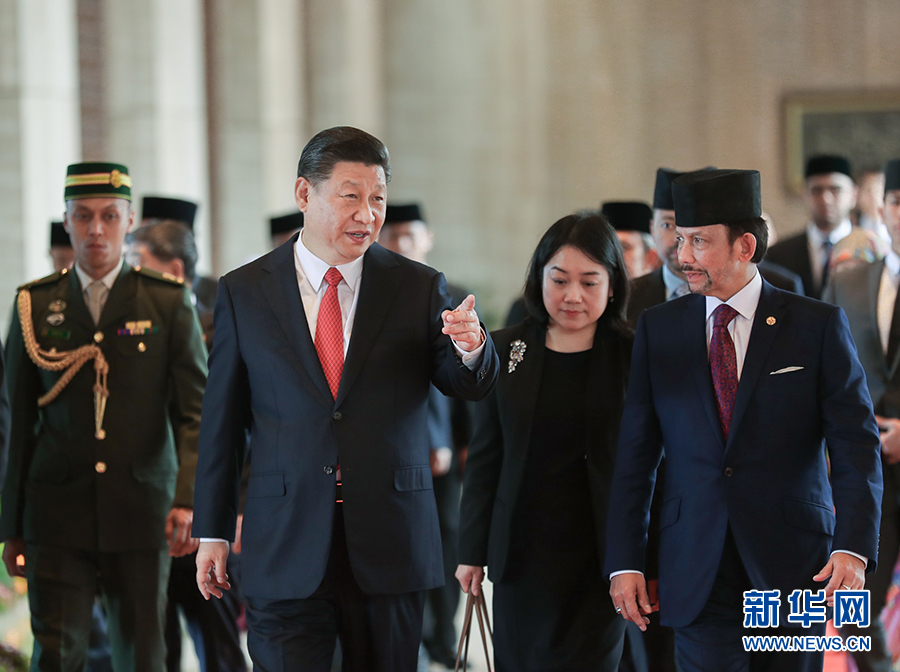 11月19日,国家主席习近平在斯里巴加湾同文莱苏丹哈桑纳尔举行会谈。这是习近平同哈桑纳尔亲切交谈。新华社记者 鞠鹏 摄
11月19日,国家主席习近平在斯里巴加湾同文莱苏丹哈桑纳尔举行会谈。这是习近平同哈桑纳尔亲切交谈。新华社记者 鞠鹏 摄
习近平同文莱王室成员亲切交谈。习近平表示,衷心祝贺文莱经济社会发展取得的成就。一踏上这片和平美丽的土地,我就真切感受到苏丹陛下和王室以及文莱人民对中国人民的深情厚谊。中方赞赏文莱王室长期奉行对华友好政策,欢迎王室成员多到中国各地走走、看看。相信在双方共同努力下,中文传统友好将不断发扬光大,两国互利合作将不断取得丰硕成果。
丁薛祥、杨洁篪、王毅、何立峰等参加上述活动。
更多阅读:
中华人民共和国和文莱达鲁萨兰国联合声明
Http://www.xinhuanet.com/politics/leaders/2018-11/19/c_129997579.htm
President Xi’s 19 Visiting Events
2018-11-19 23:53:19 Source: Xinhua International Client
Pay attention to Xinhuanet
WeChat
Weibo
Qzone
On November 19th, President Xi Jinping held talks with Brunei Sultan Hassanal in Bandar Seri Begawan. Before the talks, Xi Jinping attended the grand welcoming ceremony held by Hassanal in the square in front of the palace. Accompanied by Hassanal, Xi Jinping reviewed the honor guard. Xinhua News Agency reporter Yan Peng photo
On November 19th, President Xi Jinping held talks with Brunei Sultan Hassanal in Bandar Seri Begawan. Xinhua News Agency reporter Yan Peng photo
On November 19th, President Xi Jinping held talks with Brunei Sultan Hassanal in Bandar Seri Begawan. This is before the talks, Xi Jinping attended the grand welcoming ceremony held by Hassanal in the square in front of the palace. Xinhua News Agency reporter Yan Yan photo
On November 19th, President Xi Jinping held talks with Brunei Sultan Hassanal in Bandar Seri Begawan. This was before the talks, Xi Jinping and Hassanal stepped into the venue. Xinhua News Agency reporter Yan Peng photo
On November 19th, President Xi Jinping held talks with Brunei Sultan Hassanal in Bandar Seri Begawan. Xinhua News Agency reporter Yan Peng photo
On November 19th, President Xi Jinping held talks with Brunei Sultan Hassanal in Bandar Seri Begawan. Xinhua News Agency reporter Yan Peng photo
On November 19th, President Xi Jinping held talks with Brunei Sultan Hassanal in Bandar Seri Begawan. This is Xi Jinping's cordial conversation with Hassanal. Xinhua News Agency reporter Yan Peng photo
GVGT click here:
Http://www.xinhuanet.com/politics/leaders/2018-11/19/c_1123735386.htm
Xi Jinping Holds Talks with Brunei Sultan Hassanal
2018-11-19 15:01:59 Source: Xinhuanet
Pay attention to learning time
WeChat
Weibo
Qzone
On November 19th, President Xi Jinping held talks with Brunei Sultan Hassanal in Bandar Seri Begawan. Before the talks, Xi Jinping attended the grand welcoming ceremony held by Hassanal in the square in front of the palace. Accompanied by Hassanal, Xi Jinping reviewed the honor guard. Xinhua News Agency reporter Yan Peng photo
Xinhua News Agency, Sri Bajiawan City, November 19 (Reporter Huo Xiaoguang, Li Jianmin, Wei Jianhua) Chinese President Xi Jinping held talks with Brunei Sultan Hassanal in Bandar Seri Begawan on the 19th. The heads of state of the two countries spoke highly of the positive development momentum of Chinese relations and unanimously decided to establish a Chinese strategic partnership of cooperation and to be a good partner of political mutual trust, economic mutual benefit, humanities interoperability and multilateral mutual assistance.
Xi Jinping highly appreciated that Hassanal has long been concerned about and attached importance to Chinese relations. Xi Jinping pointed out that this is my first visit to Brunei. The warm and friendly people of Brunei, especially the friendly smiles on the faces of young people along the way, are moving. This is a true portrayal of the profound friendship between the Chinese and the Chinese people. Brunei's political and political people, the people live and work in peace and contentment, do not deserve the reputation of "state of peace." The historical and cultural links between China and Brunei are long and profound. The two countries are close neighbors across the sea and friends and partners who trust each other. The two sides decided to establish a strategic partnership of cooperation, that is, to be a good partner of political mutual trust, economic mutual benefit, humanities interoperability and multilateral mutual assistance, so that the cooperation results will better benefit the two peoples.
On November 19th, President Xi Jinping held talks with Brunei Sultan Hassanal in Bandar Seri Begawan. Xinhua News Agency reporter Yan Peng photo
Xi Jinping emphasized that the two sides should close high-level exchanges and take the helm for the development of bilateral relations. The Chinese side appreciates the firm adherence to the one-China policy and will continue to support Brunei's development path in line with its own national conditions. The Chinese side regards Brunei as an important partner for the construction of the 21st Century Maritime Silk Road. It is willing to link the "One Belt, One Road" initiative with the Brunei economic diversification strategy "2035 Hongyuan" and do a good job in the mutually beneficial cooperation between the two countries. The Chinese side welcomes Brunei enterprises to expand their exports to China. They are willing to strengthen cooperation in the areas of infrastructure construction, agriculture, fishery and energy with the Ministry of Literature and share development experiences in emerging fields such as digital economy and e-commerce. The two sides should strengthen cooperation in the fields of education, culture, sports, health, tourism, etc., enhance understanding and friendship between the younger generations of the two countries, expand local exchanges, and strengthen cooperation in areas such as justice, counter-terrorism, and combating transnational crime. It is necessary to deepen communication, coordination and mutual cooperation within the framework of the UN and APEC, and work together to promote greater development of China-ASEAN relations and East Asian cooperation. China supports ASEAN's eastern growth zone cooperation and supports ASEAN in achieving comprehensive and balanced development.
On November 19th, President Xi Jinping held talks with Brunei Sultan Hassanal in Bandar Seri Begawan. This is before the talks, Xi Jinping attended the grand welcoming ceremony held by Hassanal in the square in front of the palace. Xinhua News Agency reporter Yan Yan photo
Xi Jinping pointed out that maintaining peace and stability in the South China Sea is a matter of the interests of China and Brunei. It is also the common aspiration of the two peoples. The Chinese side appreciates the two-track approach proposed by the Chinese side, that is, the parties concerned handle disputes through friendly consultations, and regional countries jointly safeguard the stability of the South China Sea. We must continue to promote maritime cooperation and the "South China Sea Code of Conduct" consultations, and build the South China Sea into a sea of peace, a sea of friendship, and a sea of cooperation.
On November 19th, President Xi Jinping held talks with Brunei Sultan Hassanal in Bandar Seri Begawan. This was before the talks, Xi Jinping and Hassanal stepped into the venue. Xinhua News Agency reporter Yan Peng photo
Hassanal said that he warmly welcomes President Xi Jinping's first visit to Brunei. This visit will deepen the traditional friendly relations between the two countries and strengthen mutually beneficial cooperation in various fields. The friendship between the two countries has a long history, and the relations between the two countries have been continuously strengthened on the basis of mutual respect and mutual benefit. I am very pleased that during President Xi’s visit, the relationship between the two countries has been upgraded to a strategic partnership. The Chinese side firmly adheres to the one-China policy and is willing to take President Xi's visit as an opportunity to strengthen exchanges and cooperation in the fields of trade, investment, agriculture, tourism, education, humanities and judicial assistance, and promote the well-being of the two peoples. The Chinese side admires China's tremendous achievements in poverty reduction and sustainable development, and is willing to strengthen the "2035 ambition" strategy and the "One Belt, One Road" initiative. Brunei spoke highly of China's important role in promoting global stability and prosperity, coping with climate change, maintaining the multilateral trading system, and promoting regional economic integration. We thank China for supporting the ASEAN's eastern growth zone cooperation and would like to strengthen the communication between the two countries in international and regional affairs. And coordination to promote the deepening of cooperation between ASEAN and China. Brunei is pleased that the countries of the region have jointly safeguarded peace and stability in the South China Sea region and promoted maritime cooperation through dialogue and consultation.
On November 19th, President Xi Jinping held talks with Brunei Sultan Hassanal in Bandar Seri Begawan. Xinhua News Agency reporter Yan Peng photo
After the talks, the two heads of state witnessed the signing of bilateral cooperation documents such as the "One Belt, One Road" cooperation plan.
The two sides issued the "Joint Statement of the People's Republic of China and Brunei Darussalam".
On November 19th, President Xi Jinping held talks with Brunei Sultan Hassanal in Bandar Seri Begawan. Xinhua News Agency reporter Yan Peng photo
Before the talks, Xi Jinping attended the grand welcoming ceremony held by Hassanal in the square in front of the palace.
In November, the bay of Bandar Seri Bega, blue sky and blue sky, picturesque. On the morning of the same day, Brunei Crown Prince Bila came to the Chinese delegation to welcome Xi Jinping.
Next to the road near the palace, more than 4,000 prominent elementary and middle school students waved the Chinese national flag and warmly welcomed Chinese guests.
When Xi Jinping arrived at the palace, Hassanal greeted him at the parking place. The heads of state of the two countries boarded the review desk. The honor guards performed the ceremony and the military band played the national anthems of the two countries. A 21-gun salute was fired on the spot. Accompanied by Hassanal, Xi Jinping reviewed the honor guard. After reviewing the two heads of state, they went to the inner court of the palace. Xi Jinping shook hands with members of the Brunei royal family, key officials and national envoys in Brunei. Hassanal shook hands with the Chinese companions.
On November 19th, President Xi Jinping held talks with Brunei Sultan Hassanal in Bandar Seri Begawan. This is Xi Jinping's cordial conversation with Hassanal. Xinhua News Agency reporter Yan Peng photo
Xi Jinping had a cordial conversation with members of the Brunei royal family. Xi Jinping said that he sincerely congratulated Brunei on its achievements in economic and social development. As soon as I set foot on this peaceful and beautiful land, I really felt the deep friendship between His Majesty the Sultan and the royal family and the Brunei people for the Chinese people. The Chinese side appreciates the Brunei royal family's long-term policy of friendship with China and welcomes members of the royal family to visit and look around China. It is believed that with the joint efforts of both sides, the traditional Chinese friendship will continue to flourish, and mutually beneficial cooperation between the two countries will continue to achieve fruitful results.
Ding Xuexiang, Yang Jiechi, Wang Yi, He Lifeng, etc. participated in the above activities.
Read more:
Joint Statement of the People's Republic of China and Brunei Darussalam
Click to view the topic
Click to view the topic
习主席19日出访活动精彩图集
2018-11-19 23:53:19 来源: 新华国际客户端
关注新华网
微信
微博
Qzone







GVGT click here:
http://www.xinhuanet.com/politics/leaders/2018-11/19/c_1123735386.htm
习近平同文莱苏丹哈桑纳尔举行会谈
2018-11-19 15:01:59 来源: 新华网
关注学习进行时
微信
微博
Qzone

新华社斯里巴加湾市11月19日电(记者霍小光 李建敏 魏建华)国家主席习近平19日在斯里巴加湾同文莱苏丹哈桑纳尔举行会谈。两国元首高度评价中文关系积极发展势头,一致决定建立中文战略合作伙伴关系,做政治互信、经济互利、人文互通、多边互助的好伙伴。
习近平高度赞赏哈桑纳尔长期关心和重视中文关系。习近平指出,这是我第一次到访文莱,文莱人民的热情友好、特别是沿途欢迎的青少年脸上洋溢的真挚友好笑容,令人感动。这是中文两国人民深厚友谊的真实写照。文莱政通人和,人民安居乐业,不愧“和平之邦”的美誉。中国和文莱历史文化联系悠久深厚。两国是隔海相望的近邻,也是相互信赖的朋友和伙伴。双方决定建立战略合作伙伴关系,就是要做政治互信、经济互利、人文互通、多边互助的好伙伴,让合作成果更好惠及两国人民。

习近平强调,双方要密切高层交往,为两国关系发展掌好舵。中方赞赏文方坚定奉行一个中国政策,将继续支持文莱走符合自身国情的发展道路。中方视文莱为建设21世纪海上丝绸之路重要合作伙伴,愿将“一带一路”倡议同文莱经济多元化战略“2035宏愿”相对接,做好两国互利合作大文章。中方欢迎文莱企业扩大对华出口,愿同文方加强基础设施建设、农业、渔业、能源等领域合作,分享数字经济、电子商务等新兴领域发展经验。双方要加强教育、文化、体育、卫生、旅游等领域合作,增进两国青年一代了解和友谊,扩大地方交流,加强司法、反恐、打击跨国犯罪等领域合作。要深化在联合国、亚太经合组织框架内的沟通协调和相互配合,携手推动中国-东盟关系和东亚合作实现更大发展。中国支持东盟东部增长区合作,支持东盟实现全面平衡发展。

习近平指出,维护南海和平稳定事关中国和文莱切身利益,也是两国人民共同愿望。中方赞赏文方提出的双轨思路,即当事国通过友好协商处理争议,地区国家共同维护南海稳定。我们要持续推进海上合作和“南海行为准则”磋商,将南海建设成和平之海、友谊之海、合作之海。

哈桑纳尔表示,热烈欢迎习近平主席首次访问文莱,此访必将深化两国传统友好关系、加强两国各领域互利合作。文中友谊历史悠久,两国关系在相互尊重、互利共赢的基础上不断加强。很高兴习主席此访期间,两国关系提升到战略合作伙伴关系。文方坚定奉行一个中国政策,愿以习主席此访为契机,加强双方在贸易、投资、农业、旅游、教育、人文、司法协助等领域交流合作,促进两国人民福祉。文方钦佩中国在减贫、可持续发展等领域取得的巨大成就,愿加强“2035宏愿”战略同“一带一路”倡议对接合作。文莱高度评价中国在促进全球稳定繁荣、应对气候变化、维护多边贸易体制、推动区域经济一体化方面的重要作用,感谢中国支持东盟东部增长区合作,愿加强文中在国际和地区事务中的沟通和协调,推动东盟同中国合作不断深化。文莱对本地区国家通过对话协商共同维护南海地区和平稳定、推进海上合作感到高兴。

会谈后,两国元首见证了共建“一带一路”合作规划等双边合作文件的签署。
双方发表了《中华人民共和国和文莱达鲁萨兰国联合声明》。

会谈开始前,习近平出席哈桑纳尔在王宫前广场举行的盛大欢迎仪式。
11月的斯里巴加湾,碧海蓝天,风景如画。当天上午,文莱王储比拉来到中国代表团下榻处,迎请习近平。
王宫附近道路旁边,4000多名朝气蓬勃的当地中小学生挥舞中文两国国旗,热烈欢迎中国贵宾。
习近平抵达王宫时,哈桑纳尔在停车处热情迎接。两国元首登上检阅台。仪仗队行礼,军乐队奏中文两国国歌。现场鸣放21响礼炮。在哈桑纳尔陪同下,习近平检阅仪仗队。检阅毕,两国元首前往王宫内廷。习近平同文莱王室成员、主要官员及各国驻文莱使节握手。哈桑纳尔同中方陪同人员握手。

习近平同文莱王室成员亲切交谈。习近平表示,衷心祝贺文莱经济社会发展取得的成就。一踏上这片和平美丽的土地,我就真切感受到苏丹陛下和王室以及文莱人民对中国人民的深情厚谊。中方赞赏文莱王室长期奉行对华友好政策,欢迎王室成员多到中国各地走走、看看。相信在双方共同努力下,中文传统友好将不断发扬光大,两国互利合作将不断取得丰硕成果。
丁薛祥、杨洁篪、王毅、何立峰等参加上述活动。
更多阅读:
中华人民共和国和文莱达鲁萨兰国联合声明
Http://www.xinhuanet.com/politics/leaders/2018-11/19/c_129997579.htm
President Xi’s 19 Visiting Events
2018-11-19 23:53:19 Source: Xinhua International Client
Pay attention to Xinhuanet
Qzone
On November 19th, President Xi Jinping held talks with Brunei Sultan Hassanal in Bandar Seri Begawan. Before the talks, Xi Jinping attended the grand welcoming ceremony held by Hassanal in the square in front of the palace. Accompanied by Hassanal, Xi Jinping reviewed the honor guard. Xinhua News Agency reporter Yan Peng photo
On November 19th, President Xi Jinping held talks with Brunei Sultan Hassanal in Bandar Seri Begawan. Xinhua News Agency reporter Yan Peng photo
On November 19th, President Xi Jinping held talks with Brunei Sultan Hassanal in Bandar Seri Begawan. This is before the talks, Xi Jinping attended the grand welcoming ceremony held by Hassanal in the square in front of the palace. Xinhua News Agency reporter Yan Yan photo
On November 19th, President Xi Jinping held talks with Brunei Sultan Hassanal in Bandar Seri Begawan. This was before the talks, Xi Jinping and Hassanal stepped into the venue. Xinhua News Agency reporter Yan Peng photo
On November 19th, President Xi Jinping held talks with Brunei Sultan Hassanal in Bandar Seri Begawan. Xinhua News Agency reporter Yan Peng photo
On November 19th, President Xi Jinping held talks with Brunei Sultan Hassanal in Bandar Seri Begawan. Xinhua News Agency reporter Yan Peng photo
On November 19th, President Xi Jinping held talks with Brunei Sultan Hassanal in Bandar Seri Begawan. This is Xi Jinping's cordial conversation with Hassanal. Xinhua News Agency reporter Yan Peng photo
GVGT click here:
Http://www.xinhuanet.com/politics/leaders/2018-11/19/c_1123735386.htm
Xi Jinping Holds Talks with Brunei Sultan Hassanal
2018-11-19 15:01:59 Source: Xinhuanet
Pay attention to learning time
Qzone
On November 19th, President Xi Jinping held talks with Brunei Sultan Hassanal in Bandar Seri Begawan. Before the talks, Xi Jinping attended the grand welcoming ceremony held by Hassanal in the square in front of the palace. Accompanied by Hassanal, Xi Jinping reviewed the honor guard. Xinhua News Agency reporter Yan Peng photo
Xinhua News Agency, Sri Bajiawan City, November 19 (Reporter Huo Xiaoguang, Li Jianmin, Wei Jianhua) Chinese President Xi Jinping held talks with Brunei Sultan Hassanal in Bandar Seri Begawan on the 19th. The heads of state of the two countries spoke highly of the positive development momentum of Chinese relations and unanimously decided to establish a Chinese strategic partnership of cooperation and to be a good partner of political mutual trust, economic mutual benefit, humanities interoperability and multilateral mutual assistance.
Xi Jinping highly appreciated that Hassanal has long been concerned about and attached importance to Chinese relations. Xi Jinping pointed out that this is my first visit to Brunei. The warm and friendly people of Brunei, especially the friendly smiles on the faces of young people along the way, are moving. This is a true portrayal of the profound friendship between the Chinese and the Chinese people. Brunei's political and political people, the people live and work in peace and contentment, do not deserve the reputation of "state of peace." The historical and cultural links between China and Brunei are long and profound. The two countries are close neighbors across the sea and friends and partners who trust each other. The two sides decided to establish a strategic partnership of cooperation, that is, to be a good partner of political mutual trust, economic mutual benefit, humanities interoperability and multilateral mutual assistance, so that the cooperation results will better benefit the two peoples.
On November 19th, President Xi Jinping held talks with Brunei Sultan Hassanal in Bandar Seri Begawan. Xinhua News Agency reporter Yan Peng photo
Xi Jinping emphasized that the two sides should close high-level exchanges and take the helm for the development of bilateral relations. The Chinese side appreciates the firm adherence to the one-China policy and will continue to support Brunei's development path in line with its own national conditions. The Chinese side regards Brunei as an important partner for the construction of the 21st Century Maritime Silk Road. It is willing to link the "One Belt, One Road" initiative with the Brunei economic diversification strategy "2035 Hongyuan" and do a good job in the mutually beneficial cooperation between the two countries. The Chinese side welcomes Brunei enterprises to expand their exports to China. They are willing to strengthen cooperation in the areas of infrastructure construction, agriculture, fishery and energy with the Ministry of Literature and share development experiences in emerging fields such as digital economy and e-commerce. The two sides should strengthen cooperation in the fields of education, culture, sports, health, tourism, etc., enhance understanding and friendship between the younger generations of the two countries, expand local exchanges, and strengthen cooperation in areas such as justice, counter-terrorism, and combating transnational crime. It is necessary to deepen communication, coordination and mutual cooperation within the framework of the UN and APEC, and work together to promote greater development of China-ASEAN relations and East Asian cooperation. China supports ASEAN's eastern growth zone cooperation and supports ASEAN in achieving comprehensive and balanced development.
On November 19th, President Xi Jinping held talks with Brunei Sultan Hassanal in Bandar Seri Begawan. This is before the talks, Xi Jinping attended the grand welcoming ceremony held by Hassanal in the square in front of the palace. Xinhua News Agency reporter Yan Yan photo
Xi Jinping pointed out that maintaining peace and stability in the South China Sea is a matter of the interests of China and Brunei. It is also the common aspiration of the two peoples. The Chinese side appreciates the two-track approach proposed by the Chinese side, that is, the parties concerned handle disputes through friendly consultations, and regional countries jointly safeguard the stability of the South China Sea. We must continue to promote maritime cooperation and the "South China Sea Code of Conduct" consultations, and build the South China Sea into a sea of peace, a sea of friendship, and a sea of cooperation.
On November 19th, President Xi Jinping held talks with Brunei Sultan Hassanal in Bandar Seri Begawan. This was before the talks, Xi Jinping and Hassanal stepped into the venue. Xinhua News Agency reporter Yan Peng photo
Hassanal said that he warmly welcomes President Xi Jinping's first visit to Brunei. This visit will deepen the traditional friendly relations between the two countries and strengthen mutually beneficial cooperation in various fields. The friendship between the two countries has a long history, and the relations between the two countries have been continuously strengthened on the basis of mutual respect and mutual benefit. I am very pleased that during President Xi’s visit, the relationship between the two countries has been upgraded to a strategic partnership. The Chinese side firmly adheres to the one-China policy and is willing to take President Xi's visit as an opportunity to strengthen exchanges and cooperation in the fields of trade, investment, agriculture, tourism, education, humanities and judicial assistance, and promote the well-being of the two peoples. The Chinese side admires China's tremendous achievements in poverty reduction and sustainable development, and is willing to strengthen the "2035 ambition" strategy and the "One Belt, One Road" initiative. Brunei spoke highly of China's important role in promoting global stability and prosperity, coping with climate change, maintaining the multilateral trading system, and promoting regional economic integration. We thank China for supporting the ASEAN's eastern growth zone cooperation and would like to strengthen the communication between the two countries in international and regional affairs. And coordination to promote the deepening of cooperation between ASEAN and China. Brunei is pleased that the countries of the region have jointly safeguarded peace and stability in the South China Sea region and promoted maritime cooperation through dialogue and consultation.
On November 19th, President Xi Jinping held talks with Brunei Sultan Hassanal in Bandar Seri Begawan. Xinhua News Agency reporter Yan Peng photo
After the talks, the two heads of state witnessed the signing of bilateral cooperation documents such as the "One Belt, One Road" cooperation plan.
The two sides issued the "Joint Statement of the People's Republic of China and Brunei Darussalam".
On November 19th, President Xi Jinping held talks with Brunei Sultan Hassanal in Bandar Seri Begawan. Xinhua News Agency reporter Yan Peng photo
Before the talks, Xi Jinping attended the grand welcoming ceremony held by Hassanal in the square in front of the palace.
In November, the bay of Bandar Seri Bega, blue sky and blue sky, picturesque. On the morning of the same day, Brunei Crown Prince Bila came to the Chinese delegation to welcome Xi Jinping.
Next to the road near the palace, more than 4,000 prominent elementary and middle school students waved the Chinese national flag and warmly welcomed Chinese guests.
When Xi Jinping arrived at the palace, Hassanal greeted him at the parking place. The heads of state of the two countries boarded the review desk. The honor guards performed the ceremony and the military band played the national anthems of the two countries. A 21-gun salute was fired on the spot. Accompanied by Hassanal, Xi Jinping reviewed the honor guard. After reviewing the two heads of state, they went to the inner court of the palace. Xi Jinping shook hands with members of the Brunei royal family, key officials and national envoys in Brunei. Hassanal shook hands with the Chinese companions.
On November 19th, President Xi Jinping held talks with Brunei Sultan Hassanal in Bandar Seri Begawan. This is Xi Jinping's cordial conversation with Hassanal. Xinhua News Agency reporter Yan Peng photo
Xi Jinping had a cordial conversation with members of the Brunei royal family. Xi Jinping said that he sincerely congratulated Brunei on its achievements in economic and social development. As soon as I set foot on this peaceful and beautiful land, I really felt the deep friendship between His Majesty the Sultan and the royal family and the Brunei people for the Chinese people. The Chinese side appreciates the Brunei royal family's long-term policy of friendship with China and welcomes members of the royal family to visit and look around China. It is believed that with the joint efforts of both sides, the traditional Chinese friendship will continue to flourish, and mutually beneficial cooperation between the two countries will continue to achieve fruitful results.
Ding Xuexiang, Yang Jiechi, Wang Yi, He Lifeng, etc. participated in the above activities.
Read more:
Joint Statement of the People's Republic of China and Brunei Darussalam
Click to view the topic
Click to view the topic


